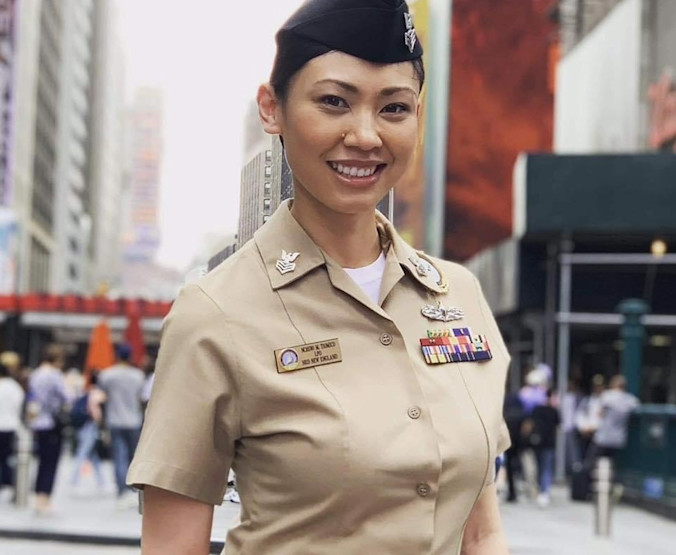
“Transitioning from the military into a civilian career can be challenging but incredibly valuable,” Ciara Tiomico, Talent Sourcer at Computershare, tells Fairygodboss. “Finding a job is easy, but a career where you can stay can be tough. That’s why I jumped to it when I saw the opportunity at Computershare to join a global company.”
For Tiomico, her role isn’t just a job; it’s a career. She has been a talent sourcer for two years at Computershare, responsible for identifying, attracting, and engaging potential candidates for job openings.

“When sourcing, my day-to-day consists of prospecting candidates using job boards, networking on social media platforms, connecting to industry-specific sites or social media groups as well as finding new ways and implementing sourcing strategies to attract top talent,” she explains. “When it comes to candidate engagement, I typically utilize social media postings and direct email or messaging. I assess their interest and blueprint if they’re suitable for current or future roles.”
In this article, Ciara discusses her position at Computershare — as well as her best advice for women veterans who are looking for jobs and for acing interviews.
How has your military background provided you with unique perspectives or talents that aid in your career today?
Being in the military was truly life-changing for me because I learned numerous lessons that transformed my perspective on life and success. Having 12 years of experience in the United States Navy, working in finance, logistics, and talent acquisition, and at the same time being a mom of two helps you face challenges in your day-to-day business:
- Adaptability and resilience: Growing up in the Philippines, I worked in the TV and fashion industry while pursuing my journalism degree. My family was shocked and doubted that I would make it or complete my Navy boot camp training. Working on the USS Milius (DDG 69), I learned to adapt and be resilient in dealing with different people and situations. Even when I transitioned to a new role in the Navy as a Career Recruiter, I was able to adapt professionally and personally to being a mom.
- Leadership and teamwork: I found my passion in leading others to their personal and the team’s success while in the military. It sparked my interest that I shouldn’t only add value internally but also externally to make the community a better place. From leading our First Class Petty Officers Association as President in New York and New England districts as well as currently leading youth groups and church planting in the community, it’s not always about yourself anymore but how you can help others.
- Time management and organization: In the Navy, tasks are often prioritized based on urgency and importance. Identifying the key objectives, potential impact, deadlines, and overall goals can be applied to current or future roles. Using techniques like Eisenhower’s Urgent/Important principle can help you manage your time and focus on what matters most. We used several Navy programs and tools in organization techniques, which we can also relate to and utilize on current technology that’s available. Military personnel rely on technology and specialized tools to streamline processes and enhance efficiency.
As a talent acquisition Sourcer and a veteran, what is your number one piece of advice for veterans, and especially women veterans, who are looking for jobs right now?
Advice for Women:
- Confidence and assertiveness: Believe in your talents, skills, and abilities. Confidence is key during interviews and in the workplace. Assertiveness in expressing your ideas and negotiating for what you deserve is crucial. I thought it would have been hard to break through in the military field where men are more dominant in numbers, but I learned when you know your job and what you can do, it will reflect from within.
- Networking and mentorship: Leverage networking opportunities to connect with professionals in your industry. I always surround myself with the right people to add value. Additionally, seek out mentors who can provide guidance and support as you navigate your career path.
- Continuous learning and skill development: Stay updated with industry trends and advancements by engaging in continuous learning and skill development. Invest in training programs, workshops, and certifications to enhance your expertise. Follow pages or news that will provide insights.
- Work-life balance: Prioritize your well-being and maintain a healthy work-life balance. Set boundaries to prevent burnout and ensure that you have time for family, social, and other personal pursuits.
Advice for Veterans:
- Translate military skills: Civilian sectors or companies won’t understand military job codes, Military Occupation Specialty (MOS), or military ratings. As veterans and candidates applying for a job, it’s our job to communicate our value to companies. If your resume doesn’t clearly outline your value, your opportunity might be missed. Highlight your leadership, teamwork, problem-solving, adaptability, and other transferable skills.
- Utilize veteran resources: Take advantage of resources and programs designed to support veterans in their transition to civilian careers. This includes career counseling, resume assistance, job placement services, and educational opportunities.
- Network with fellow veterans: They can provide valuable advice and support based on their own experiences of transitioning into civilian roles. One thing I did right away when I knew I was getting out of the U.S. Navy was to connect and join LinkedIn military groups. I gained more insights, job leads, and referrals and felt more ready. Attend career fairs, industry events, and online networking platforms to expand your professional network.
- Be flexible and open-minded: Be flexible and open-minded when exploring job opportunities. Your ideal job may not be directly related to your military specialty, but there are often transferable skills that can be applied across various industries and roles.
What are the top three qualities/skills that you look for when you’re interviewing a candidate for a role in your industry?
- Technical competence and problem-solving skills: The candidate must have the necessary technical skills to perform the job effectively based on the job description or role. It’s not only knowledge specific to the role but also their ability to approach and solve problems creatively and efficiently. I ask technical questions related to the job, or if they can present real-world scenarios and/or case studies, so I can evaluate their thought process and problem-solving approach.
- Cultural fit: A candidate who aligns with our Purple values (certainty, ingenuity, and advantage) and our culture is more likely to be engaged, productive, and stay with the company longer. To prepare, a candidate must be ready to answer situational and behavioral questions. As a sourcer, it gives me an understanding of how they worked in teams in the past. It reveals who they are, and how they handle conflict, collaboration, and feedback.
- Growth potential and teachable spirit: Computershare is an environment that is constantly evolving, and roles often change. Candidates who demonstrate the ability and willingness to learn and grow can adapt to new challenges and contribute to our company’s future success. When assessing, I ask about their past experiences, how or when they learned new skills, how they stay current with industry trends, and how they adapt to change. I ask questions to further understand their goals, and interests in professional development, continuous learning, and self-improvement.
What are your top pieces of advice for acing an interview?
- Preparation is key. You must prepare and research the company. You should know its culture, products/services, and recent news. Sometimes these are the things that candidates miss. Aside from understanding the job description thoroughly, anticipate common interview questions and prepare thoughtful responses.
- Showcase your skills and achievements. During the interview, highlight specific examples of how your skills and experiences relate to the job requirements. Use the STAR method (situation, task, action, result) to structure your answers and provide concrete examples of accomplishments. This is helpful but also don’t use this same method all the time because you’ll end up sounding too robotic with every response.
- Demonstrate your fit. Emphasize your enthusiasm for the role and the company. Showcase your understanding of the company’s values and mission. Explain how your personality, character, work style, and goals align with the company culture and the team you’ll be working with. Be true to yourself and ask, “Why should I be hired for this position?”
- Communicate effectively. Communication is about connecting, and it still truly can be nerve-racking speaking with the interviewer or hiring manager. Practice in front of the mirror or ask someone you trust to conduct a mock interview to get yourself comfortable. Some interviews right now are still being held online through video call, but some are being conducted in person. Either way, always practice active listening, maintain good eye contact, and pay attention to your body language. Speak clearly and confidently. Tailor your communication style to match the interviewer, whether they prefer a formal or more casual approach.
- Ask thoughtful questions. Prepare insightful questions to ask the interviewer about the company, team dynamics, career development opportunities, or any recent company developments. Don’t be afraid to ask the hiring manager about their experience in the company as well. This shows your genuine interest in the role and helps you gather valuable information to make an informed decision if an offer is extended.
Remember, your confidence, authenticity, and a positive mental attitude are also crucial factors in making a strong impression and acing your interview.
